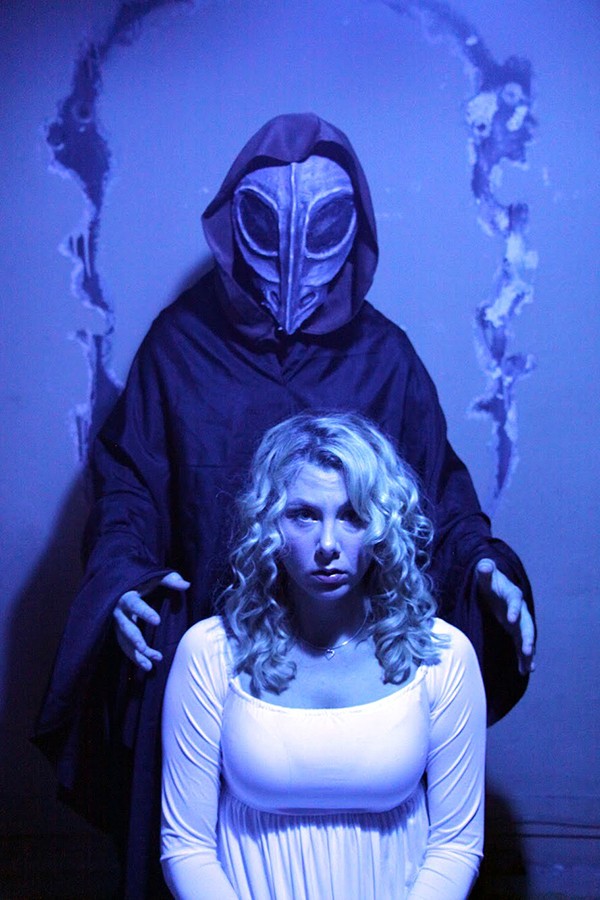Technically speaking, Tony Horne left Memphis in 2004 after a two-year stint teaching theater at Rhodes College. Fortunately for Memphis theatergoers, Horne, a U of M alum who had previously served as executive producer for the now-defunct Memphis Black Repertory Company, has never been able to stay away for very long. He directed Trouble in Mind, which was the last show produced at the old Circuit Playhouse on Poplar before it became the Evergreen Theatre. He’s directed Crumbs from the Table of Joy, Jar the Floor, No Niggers, No Dogs, No Jews, Crowns, and For Colored Girls Who Have Considered Suicide When the Rainbow Is Enuf. Now Horne, who is currently a theater professor at the University of Wisconsin at Milwaukee, has returned to Memphis to work on two very different performance projects. He is producing a bare-bones version of Beauty’s Daughter at the Evergreen Theatre and directing a similarly lean production of The Wiz to open the Hattiloo Theatre’s 2010-11 season.
“It’s a funny thing when you’re a part of a creative community,” Horne says. “I grew up here and took my MFA here. The relationships I’ve made are lifetime relationships. It’s an honor that people in Memphis keep asking me to come back to do things. It serves a triple purpose: I get to keep growing creatively, I get to come back and visit my friends and family, and it all helps me build my tenure package to help me keep my job in Wisconsin.”
Horne says this most recent trip is special for him because it marks a return to producing in Memphis. His production company, the Mosaic Group, which was born from the ashes of Memphis’ Black Rep, is co-producing Beauty’s Daughter with Milwaukee’s Uprooted Theatre Company. “[The Black Rep] was rehearsing For Colored Girls when it folded,” Horne explains. “I went ahead and produced it myself with a lot of help from [Playhouse on the Square’s executive producer] Jackie Nichols. I had to make up a company name, so I called it the Mosaic Group. I put my own personal phone number on all of our posters, and I would go out late at night and put flyers on people’s car windows. I also prayed a lot.”
Uprooted, Horne’s producing partner, was formed in 2009 by four African-American artists, including one student at the university where Horne teaches and one alum. “Their first season was small but impactful,” Horne says. “Milwaukee has a large African-American population, but that’s not reflected in the local theater community. The artists who started Uprooted wanted to do something about that, which is very much how Memphis artists do things. Memphis artists don’t wait for somebody else. If they want to do something, they just go ahead and do it.”
Beauty’s Daughter, a performance monologue that New York Times theater writer Wilborn Hampton once compared to Dante’s journey through hell, was created by poet and performance artist Dael Orlandersmith. It was Uprooted’s first production with company member Marti Gobel playing the various roles Orlandersmith had originally written for herself.
“I was just blown away by what I saw,” Horne says, explaining why he chose to bring Gobel in to re-create the performance, instead of casting a Memphis artist. “This business is all about creating relationships,” he says. “I want Uprooted and the Hattiloo to have a relationship. I want to introduce [Gobel] to Playhouse on the Square.”
Horne is currently splitting his attention between his work as a producer on Beauty’s Daughter, which opens at the Evergreen Theatre on August 5th, and his work as a director on The Wiz, which opens at the Hattiloo on August 19th.
“I have to focus on the basic story [of The Wiz],” Horne says, acknowledging the challenges of doing a big musical in a space as small as the Hattiloo. “I recently did a children’s theater production of the show with 16 children and seven adults. I can take the lessons I learned working on that show and apply them here. The story is simple, really. We may not have much in the way of visual spectacle, but that’s okay. It’s just a different way of telling the story.”
 Lost In Found
Lost In Found 

